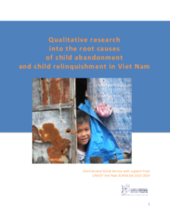ISS, with support from UNICEF Viet Nam and MOLISA, undertook research on child abandonment and relinquishment in 2011 and 2012, as part of its follow up technical support to Viet Nam in overhauling its adoption system. Field assessments were carried out in five provinces and qualitative information was collected during interviews with 146 respondents with strong connections to issues of child abandonment and relinquishment. Information was collected in face-to-face, semi-structured interviews with 35 mothers/fathers or family members who had relinquished a child.
The results demonstrated that when a child is separated from his or her parents, there are often grave ramifications for all involved. For the child who is abandoned or relinquished, they are deprived of knowing and being cared for by his or her parents – creating in many cases an impossibility to know one’s origins. For mothers, fathers and other family members who abandon or relinquish a child, there is frequently a perpetual sense of loss, guilt and shame. For Vietnamese society, there is a breakdown in the family, which is considered the fundamental unit of society. For receiving countries and prospective adoptive parents, it is important that the origins of children are genuinely recorded and that these children are truly in need of adoption as a child protection measure.
With regards to why children are relinquished in Viet Nam, multiple factors and root causes were identified. While poverty was cited as the main reason for relinquishment by study participants, the research showed that it was only when one or more negative events impacted an already-struggling family that the family decided to relinquish a child. These negative events included loss of income, poor health or a death in the family. The research revealed that it was these negative events that were the "tipping points" for the decision to relinquish a child.

